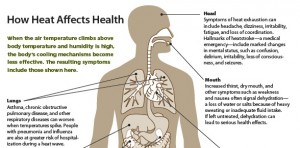The Union of Concerned Scientists says dangerous heat waves are happening more often in St. Louis, and posing a more frequent threat to residents. It’s released a report called Heat in the Heartland: A Look Back at 60 Years of Warming in the Midwest.
The report looked at how summer air masses have changed during the last 6 decades. Climate Scientist Todd Sanford says one type of air mass that negatively affects human health has become more frequent.
“The city now has twice as many … nine or more days on average … of the hottest and most humid weather each summer than in the mid 1940s. That’s not to say that every summer sees nine more days of this hot weather. Some may see more, some less, but this is what the average St. Louis summer can now expect.”
Sanford says St. Louis can also expect four fewer cooler, dry days, and less relief at night. “Temperatures on hot, humid nights have actually risen over the period by just over two degrees farenheit, while 3 a.m. temperatures on hot dry nights are also going up and now they’re on average about four-and-a-half degrees higher than they were about 60 years ago.”
More heat means more health risks
Co-Author and post-doctoral fellow Jalonne White-Newsome says part of the motivation for the study is to drive home the threat that extreme heat is to human health.
“One of the major concerns is trying to make sure that people understand that heat is a risk regardless of who you are, especially when the weather is hot and humid or hot and dry. Our bodies in general find it somewhat challenging to adapt sometimes in this hot, humid weather.”
White-Newsome says not having cool nights to recuperate from the heat poses a particular concern.
“What happens is that if your body really doesn’t get any relief at night that it normally would on a cool summer evening, there’s a harvesting effect that happens and so the body just continues to heat up, and that again can progress from heat stress to heat stroke.”
2012 already a tragic year in St. Louis
City Health Director Pamela Walker says there have been 24 heat-related deaths so far this year in St. Louis.
“I think all but one of those were in that 10 day period starting June 28 and ending July 7. We had 19 for all of last year in the region.”
The study looked at the same information for Detroit, Chicago, Cincinnati and Minneapolis and found similar patterns. St. Louis showed the strongest change of those cities.
It also compared St. Louis data to readings from the airport near Columbia, which is in a more rural area, and found similar patterns. It concludes that changes in St. Louis were consistent with a regional climate change in the last six decades.
The study was not intended to determine whether human activity is responsible for any changes.


